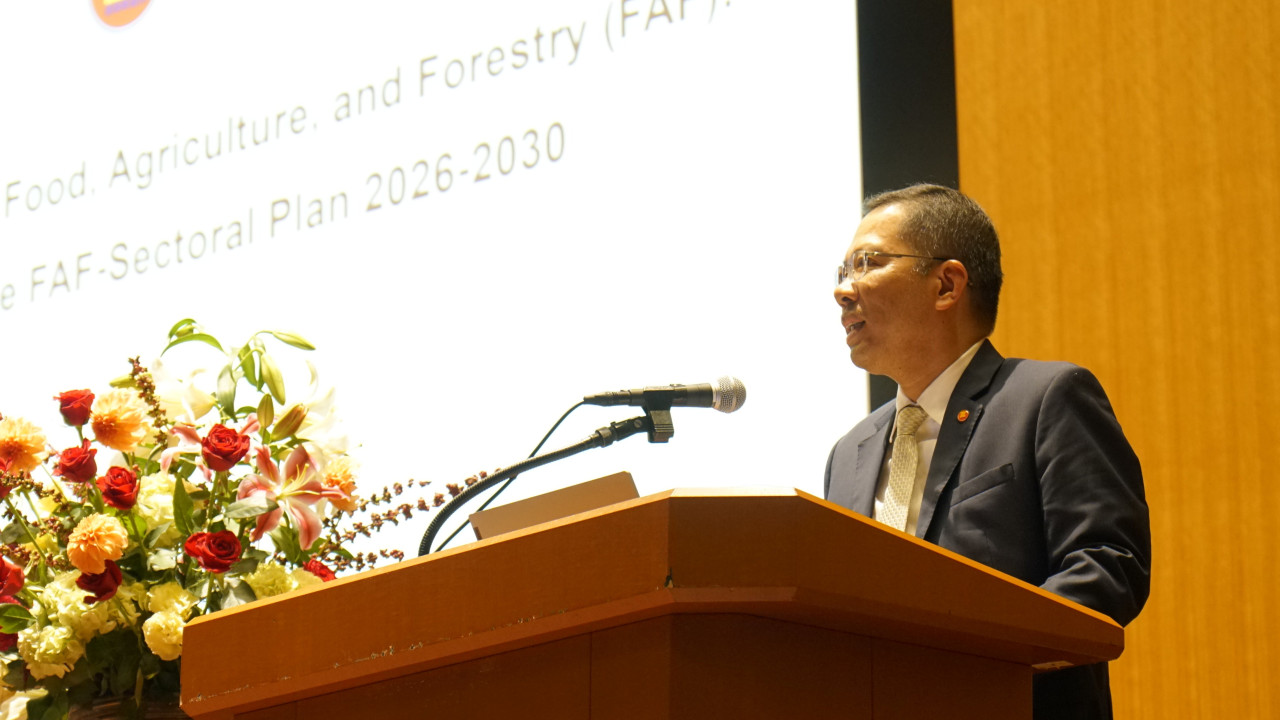On October 27, 2025, the Japan International Research Center for Agricultural Sciences (JIRCAS) held the JIRCAS International Symposium 2025 at Hitotsubashi Hall in Tokyo. The theme of the symposium was: “Accelerating Application of Agricultural Technologies in the Asia-Monsoon Region: Taking Stock and the Way Forward for Enhancing Production Potentials and Sustainable Food Systems.”
Since the United Nations Food Systems Summit (UNFSS) in 2021, global food systems have undergone a major transformation. In response, the Japanese government has promoted initiatives such as the Strategy for Sustainable Food Systems, MIDORI (2021) and the ASEAN-Japan MIDORI Cooperation Plan (2023), and in 2025 announced a new international initiative titled MIDORI∞INFINITY.
Building on these policies, JIRCAS is advancing the Green Asia Project, which aims to enhance productivity and sustainability in the Asia-Monsoon region by accelerating the application of technologies through multilateral cooperation. This symposium was organized to share the project’s achievements and lessons learned, and to explore future directions for international collaboration.
Session I featured keynote speeches by Dr. Stefanos Fotiou, Director of the UN Food Systems Coordination Hub; Dr. Pham Quang Minh, Head of Food, Agriculture and Forestry Division at the ASEAN Secretariat; and Dr. HAGIWARA Hideki, Counsellor and Deputy Director-General for Environment in the Export and International Affairs Bureau at the Ministry of Agriculture, Forestry and Fisheries (MAFF), Japan. Following the keynote addresses, Dr. FUNAKI Yasuro, Green Asia Project Leader, gave a presentation outlining the project's background and activities from the perspectives of global, Japanese, and ASEAN collaboration.
Session II, which also served as a coffee break and networking session, featured poster presentations on technologies listed in the technology catalog. Researchers from JIRCAS, the National Agriculture and Food Research Organization (NARO), the Forestry and Forest Products Research Institute (FFPRI) of the Forest Research and Management Organization (FROM), the Japan Fisheries Research and Education Agency (FRA), the National Institute of Advanced Industrial Science and Technology (AIST), as well as various universities, showcased their research achievements and engaged in active discussions with participants.
In Session III, Dr. Mohamad Zabawi bin Abdul Ghani, Director General of the Malaysian Agricultural Research and Development Institute (MARDI) appeared via video to introduce sustainable technology development, and Dr. Phisamai Srichayet, Researcher (Professional Level) at the Institute of Food Research and Product Development, Kasetsart University, presented on the role of innovation in food processing and efforts toward transforming food systems. They spoke as members of the International Scientific Advisory Board for Strategy MIDORI.
Session IV was chaired by JIRCAS Information Program Director IIYAMA Miyuki and featured a high-level discussion with members of the International Scientific Advisory Board, including Prof. Shenggen Fan (Chair Professor and Dean of the Academy of Global Food Economics and Policy (AGFEP) at China Agricultural University), Dr. Jacqueline Hughes (Secretary General of the World Agricultural Forum, online), Prof. Joachim von Braun (Distinguished Professor at Bonn University, online), and Dr. Jean Balié (Senior Advisor to FAO, via video message). They were joined by keynote speakers Dr. Stefanos Fotiou and Dr. Pham Quang Minh, as well as Dr. NOZAWA Satoshi (Director of the International Research Collaboration Division, Agriculture, Forestry and Fisheries Research Council Secretariat, MAFF, Japan), Dr. SAITO Kazuki (Senior Scientist at the International Rice Research Institute), and Dr. HAYASHI Keiichi (Environmental Program Director at JIRCAS).
Panelists highly praised the Project as a groundbreaking initiative aimed at transforming food systems. They noted its efforts to systematize sustainable agricultural technologies developed in Japan, select and validate those ready for application, and widely promote the conditions necessary for social implementation. Looking ahead, they proposed incorporating the perspectives of technology beneficiaries (such as farmers and communities) and institutional reform (including policy and legal frameworks), while introducing coordination mechanisms to strengthen collaboration with international organizations and the private sector.
A recording of the symposium will be made available on the official JIRCAS YouTube channel, “JIRCAS channel,” at a later date.

